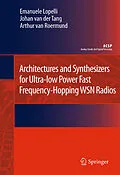Wireless sensor networks have the potential to become the third wireless revolution after wireless voice networks in the 80s and wireless data networks in the late 90s. Unfortunately, radio power consumption is still a major bottleneck to the wide adoption of this technology. Different directions have been explored to minimize the radio consumption, but the major drawback of the proposed solutions is a reduced wireless link robustness.
The primary goal of Architectures and Synthesizers for Ultra-low Power Fast Frequency-Hopping WSN Radios is to discuss, in detail, existing and new architectural and circuit level solutions for ultra-low power, robust, uni-directional and bi-directional radio links.
Architectures and Synthesizers for Ultra-low Power Fast Frequency-Hopping WSN Radios guides the reader through the many system, circuit and technology trade-offs he will be facing in the design of communication systems for wireless sensor networks. Finally, this book, through different examples realized in both advanced CMOS and bipolar technologies opens a new path in the radio design, showing how radio link robustness can be guaranteed by techniques that were previously exclusively used in radio systems for middle or high end applications like Bluetooth and military communications while still minimizing the overall system power consumption.
Inhalt
1 Introduction.- 2 System-Level and Architectural Trade-offs.- 3 FHSS Systems: State-of-the-art and Power Trade-offs.- 4 A One-way Link Transceiver Design.- 5 A Two-way Link Transceiver Design.- 6 Summary and conclusions.- 7 Acronyms.- Appendices.- A Walsh based harmonic rejection sensitivity analysis.- References.
